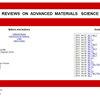Predicting mechanical properties of sustainable green concrete using novel machine learning: Stacking and gene expression programming
IF 3.9
4区 材料科学
Q2 MATERIALS SCIENCE, MULTIDISCIPLINARY
引用次数: 0
Abstract
Using rice husk ash (RHA) as a cement substitute in concrete production has potential benefits, including cement consumption and mitigating environmental effects. The feasibility of RHA on concrete strength was investigated in this research by predicting the split tensile strength (SPT) and flexural strength (FS) of RHA concrete (RHAC). The study used machine learning (ML) methods such as ensemble stacking and gene expression programming (GEP). The stacking model was improved using base learner configurations ML models, such as, random forest (RF), support vector regression, and gradient boosting regression. The proposed models were validated by statistical tests and external validation criteria. Moreover, the effect of input parameters was investigated using Shapley adaptive exPlanations (SHAP) for RF and parametric analysis for GEP-based models. The analysis revealed that the stacking ensemble integrates base learner predictions and demonstrated superior performance, with利用新型机器学习预测可持续绿色混凝土的力学性能:堆叠和基因表达编程
在混凝土生产中使用稻壳灰(RHA)作为水泥替代品具有潜在的好处,包括降低水泥消耗和减轻环境影响。本研究通过预测 RHA 混凝土(RHAC)的劈裂拉伸强度(SPT)和抗折强度(FS),考察了 RHA 对混凝土强度的可行性。研究采用了机器学习(ML)方法,如集合堆叠和基因表达编程(GEP)。使用随机森林(RF)、支持向量回归和梯度提升回归等基础学习者配置 ML 模型改进了堆叠模型。提出的模型通过统计测试和外部验证标准进行了验证。此外,还使用 Shapley adaptive exPlanations (SHAP) 对 RF 模型和基于 GEP 的模型进行了参数分析,研究了输入参数的影响。分析表明,堆叠集合整合了基础学习器的预测,表现出卓越的性能,R 值分别大于 0.98 和 0.96。SPT 和 FS 的平均绝对误差和均方根误差值分别为 0.23、0.3、0.5 和 0.7 MPA。SHAP 分析表明,水、水泥、超塑化剂和龄期是影响 RHAC 强度的参数。此外,使用标准设计程序中的 GEP 表达式可预测 RHAC 的 SPT 和 FS,误差可接受。
本文章由计算机程序翻译,如有差异,请以英文原文为准。
求助全文
约1分钟内获得全文
求助全文
来源期刊

Reviews on Advanced Materials Science
工程技术-材料科学:综合
CiteScore
5.10
自引率
11.10%
发文量
43
审稿时长
3.5 months
期刊介绍:
Reviews on Advanced Materials Science is a fully peer-reviewed, open access, electronic journal that publishes significant, original and relevant works in the area of theoretical and experimental studies of advanced materials. The journal provides the readers with free, instant, and permanent access to all content worldwide; and the authors with extensive promotion of published articles, long-time preservation, language-correction services, no space constraints and immediate publication.
Reviews on Advanced Materials Science is listed inter alia by Clarivate Analytics (formerly Thomson Reuters) - Current Contents/Physical, Chemical, and Earth Sciences (CC/PC&ES), JCR and SCIE. Our standard policy requires each paper to be reviewed by at least two Referees and the peer-review process is single-blind.
 求助内容:
求助内容: 应助结果提醒方式:
应助结果提醒方式:


